5 December 2011--UN in Cambodia
The United Nations has a significant presence in both modern-day Cambodia and in its history. It was the United Nations that organized the first elections after the Khmer Rouge in 1993 that established the somewhat functioning government ruling Cambodia today. And after the elections, the U.N. stayed on. Today possibly every U.N. agency and program is operating in the kingdom. The U.N. isn't always as good as it could be but its presence is necessary. It provides expertise, support, financing, encouragement, and vision to a developing society. It also provides a whipping boy to the government who can blame the United Nations (and the NGOs) for anything going wrong in the country, or just to distract people's attention from the government's ineptitude.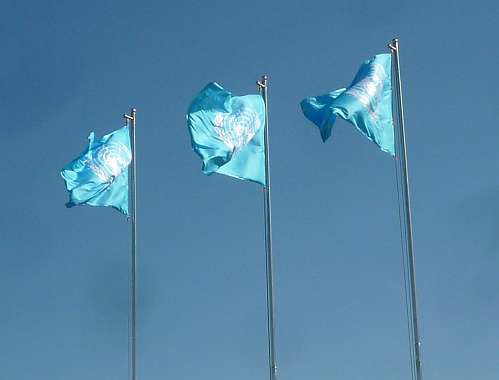
28 November 2011--Anti-landmine Conference
This week more than 1,000 delegates from over 150 countries are gathered in Phnom Penh for the 11th Meeting of the States Parties working to implement the anti-landmine treaty passed in Quebec several years ago. The stumbling blocks to a comprehensive ban on the manufacture, storage, and use of landmines are China, Russia, and the United States which all refuse to give up landmines. Two days ago the United States proposed a new regulation that would not ban landmines but would allow the use of more high-tech mines, supposedly a safer alternative. Unsurprisingly, the US's measure was defeated. This vehicle is a landmine clearance vehicle used by Halo Trust in clearing mines in Cambodia. Halo Trust is one of the world's leaders in clearing mines and unexploded ordnance.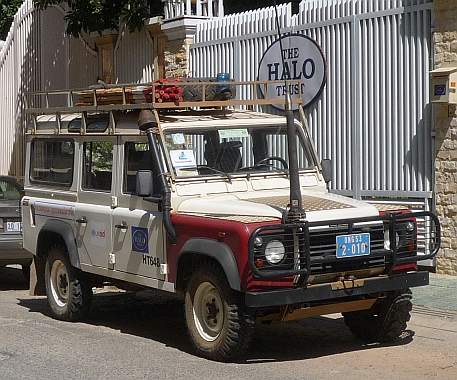
30 October 2011--Royal Anniversary
Today was the 30th anniversary of retired King Sihanouk's return to the throne. He was exiled twice and returned to power twice. The celebration at the Royal Palace along the riverfront had traffic blocked and rerouted for blocks and blocks. It was really difficult to get to mass this morning.
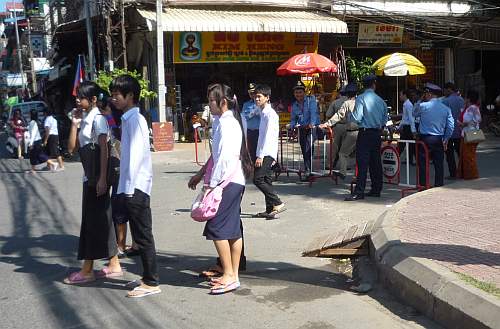
Above, school children in uniform who were required by the government to show up this morning, in front of one of the barriers blocking the roads leading the area around the palace. In the second picture a man carries a photo of the king and royal and Cambodian flags to the gathering in front of the royal viewing stand. The old king remains enormously popular.
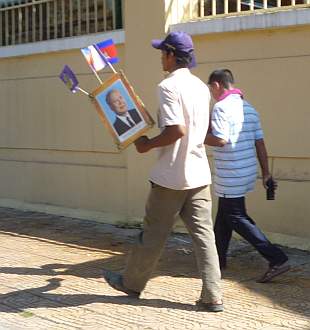
27 October 2011--Sanctioned Chaos
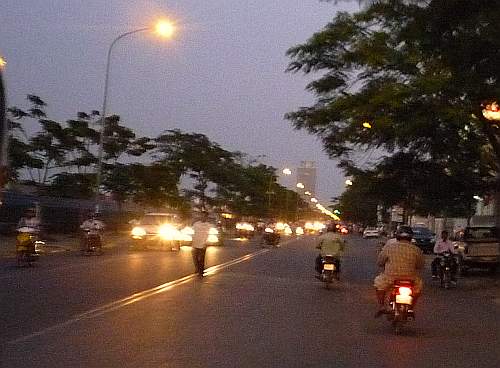 Traffic anytime in Phnom Penh is dangerous and chaotic. Nighttime traffic is especially so, partly because probably fewer than 50% of the vehicles have the functioning lights expected (in a developed country) for driving in the dark. In this photo there are six motorcycles and only one has lights. And you can't see the cars without lights. They don't show up. It's not that those drivers are waiting to turn their lights on. They don't have lights; they don't work. Drivers in Cambodia think nothing at all of driving without lights or signals. Of course, that is one of the prime reasons the death toll averages four or five a day here. And what exacerbates the insanity is that the police will stop and fine a person for driving with lights on during the day. There is obviously no justification for that except it is another way to extort money.
Traffic anytime in Phnom Penh is dangerous and chaotic. Nighttime traffic is especially so, partly because probably fewer than 50% of the vehicles have the functioning lights expected (in a developed country) for driving in the dark. In this photo there are six motorcycles and only one has lights. And you can't see the cars without lights. They don't show up. It's not that those drivers are waiting to turn their lights on. They don't have lights; they don't work. Drivers in Cambodia think nothing at all of driving without lights or signals. Of course, that is one of the prime reasons the death toll averages four or five a day here. And what exacerbates the insanity is that the police will stop and fine a person for driving with lights on during the day. There is obviously no justification for that except it is another way to extort money.
24 August 2011
Cambodia is a grossly undereducated country and that seems to lead to a national inferiority complex, at least among its highest level officials who have been acquiring suspect doctorate degrees and masters degrees, both honorary and "earned." The granting university is Isles International University, an institution, based in Malaysia, known for making false claims about its accreditation. Recently fifteen senior officials and members of the national legislature received degrees from Isles, supposedly after fourteen of the recipients studied by distance learning and wrote and defended theses. A very real question is whether any of them actually had any classroom time. Isles, formerly known as Irish International University until the Irish government repudiated it, granted an honorary doctorate to the prime minister in 2006. Although claiming to be registered in Ireland and the UK, Isles is not on the list of recognized UK institutions of higher learning and at least one other country has posted a warning about the false claims of Isles. The whole episode says a lot about education in Cambodia and a maybe desperate need for acceptance on the part of its leaders.
23 August 2011--Pleasant Surprise
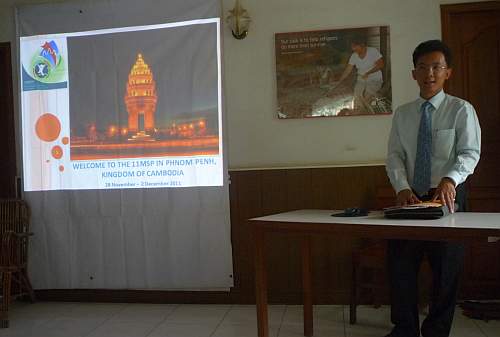 Just this morning I was riding my bicycle through the chaos of Phnom Penh's streets and reflecting that the government's incompetence is certainly not limited to traffic control. Almost every area of civic life is skewed, corrupted, inadequate. But then this afternoon I went to a meeting about the anti-landmine and cluster bombs campaigns. Maryknoll was a major agent in initiating this campaign in 1994 and was invited back today even though Maryknoll is no longer directly involved with the issue. The meeting today was to give information about an international meeting in November of the eleven Member States who lead the anti-landmines effort. The meeting will be held in Cambodia, and this time the government is being amazingly responsive and constructive. H.E. Hem Vanndy (left) is the government's person responsible for the meeting and from his description the government is actually doing the planning and preparation right. It is so wonderful to run into good people in the government.
Just this morning I was riding my bicycle through the chaos of Phnom Penh's streets and reflecting that the government's incompetence is certainly not limited to traffic control. Almost every area of civic life is skewed, corrupted, inadequate. But then this afternoon I went to a meeting about the anti-landmine and cluster bombs campaigns. Maryknoll was a major agent in initiating this campaign in 1994 and was invited back today even though Maryknoll is no longer directly involved with the issue. The meeting today was to give information about an international meeting in November of the eleven Member States who lead the anti-landmines effort. The meeting will be held in Cambodia, and this time the government is being amazingly responsive and constructive. H.E. Hem Vanndy (left) is the government's person responsible for the meeting and from his description the government is actually doing the planning and preparation right. It is so wonderful to run into good people in the government.
22 August 2011--Cambodian Funeral
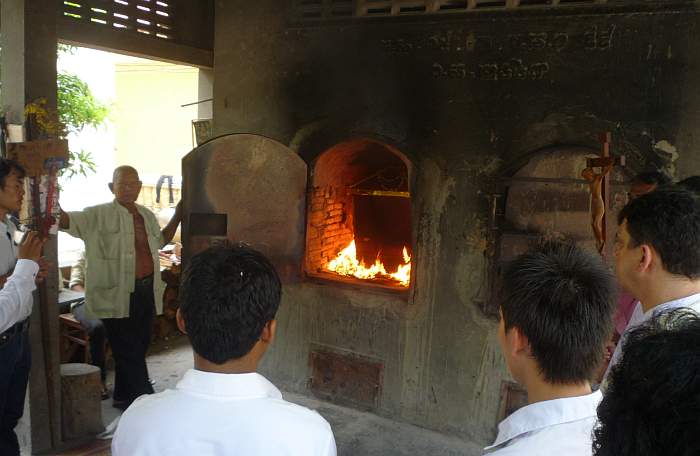
Today we had the funeral and cremation for Metry, a wonderful Catholic Cambodian woman who was so good to so many people. She was a nurse and ran the medical services for a Maryknoll project in the area of Phnom Penh called Boeung Tum Pun. She died of kidney failure. Her death was difficult but today a very loving and appreciative community gathered in the church at Boeung Tum Pun and then at the crematorium to see her complete her ashes to ashes journey.
20 August 2011--42(-12) Tower
When I arrived in Phnom Penh in 2000 there was one building--the Intercontinental Hotel--with more than four floors. Today there are a number of buildings above ten stories, and this building, the 42 Tower, was to be the highest in the country with 42 floors. Unfortunately, though, the economic slowdown developed about a year after the project began and now it is stalled at 30 floors. And likely to stay there for quite a while. 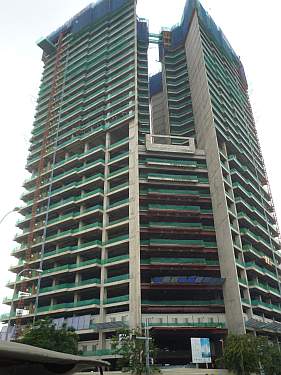
27 July 2011--Late Night Visitor

As soon as I woke up this morning and looked at the window, I knew I had a visitor last night because my curtain was stuck in the security grill that is a part of most windows in Cambodia. Someone had approached my room on the little outside walkway around my fourth-floor flat and pulled back the curtain to look in. I was wondering if I had the Khmer language to describe what had happened to the landlord later in the day.
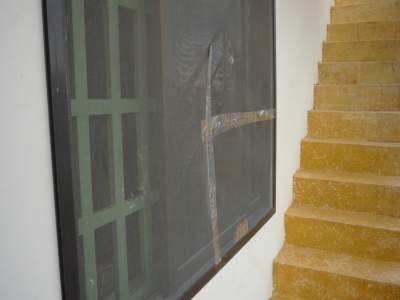 Then while I was dressing, the landlord came up to tell me that a thief had looked into my room and apparently saw nothing he could reach to steal (I deliberately keep everything valuable out of sight and out of reach from the windows, anticipating the day this would happen) and had then gone downstairs and stolen a laptop from a desk a Korean missionary had by his third-floor window. The thief had cut the screen to do it. It is always a matter of when, not if, such things will happen to every foreigner who is not diligent. The thieves know the foreigners have the money and the goods, and they just make the rounds every night, finding enough careless or clueless victims to keep them in business.
Then while I was dressing, the landlord came up to tell me that a thief had looked into my room and apparently saw nothing he could reach to steal (I deliberately keep everything valuable out of sight and out of reach from the windows, anticipating the day this would happen) and had then gone downstairs and stolen a laptop from a desk a Korean missionary had by his third-floor window. The thief had cut the screen to do it. It is always a matter of when, not if, such things will happen to every foreigner who is not diligent. The thieves know the foreigners have the money and the goods, and they just make the rounds every night, finding enough careless or clueless victims to keep them in business.
26 July 2011--Cheating Center

3 June 2011--Phnom Penh Parking
Phnom Penh is a small town that has been overtaken by the 21st century. It has little idea of what to do about vehicles and traffic and not really any political will to do anything about an increasingly serious traffic and parking problem. Here are cars quadruple parked on a street outside the Ministry of the Environment while another row of cars occupies the sidewalk. 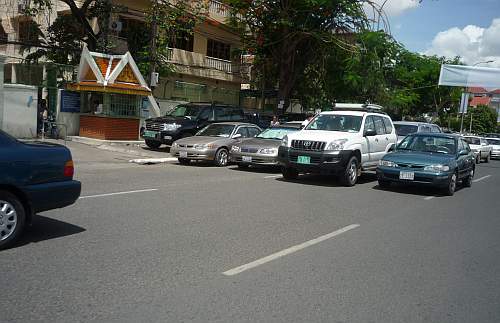
31 May 2011--Why Go to School?
Tomorrow is International Children's Day, a public holiday in Cambodia. Because schools will be closed tomorrow, each school had a small celebration this morning. A Ministry of Education staffer presided over an introduction of some invited guests and then read a letter from Prime Minister Hun Sen--the children talking to each other the whole while--and then everyone went home! The holiday is tomorrow. The country already has more public holidays than almost any other nation and it desperately needs an educated generation, but that doesn't stop the teachers from telling the kids to go home today! Why work when you don't have to? 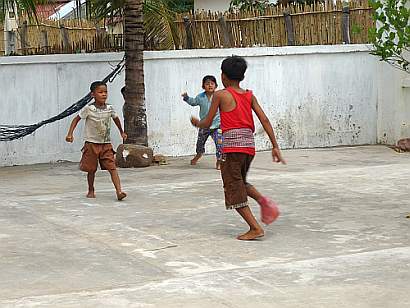
30 May 2011--Signs Appear, Jesus Doesn't

29 May 2011--CPP Supporter
With a sign this size, you might expect to find a district office of the Cambodian People's Party on this property. But, no...it's just one of the party's "supporters." A huge amount of money and work is expended putting up CPP signs around the country in the homes and businesses of its members. They may or may not actually endorse the party, but it always helps to be on the right side, especially when it's election time and they are passing out gifts. The signs let the party hacks know where to make the deliveries. 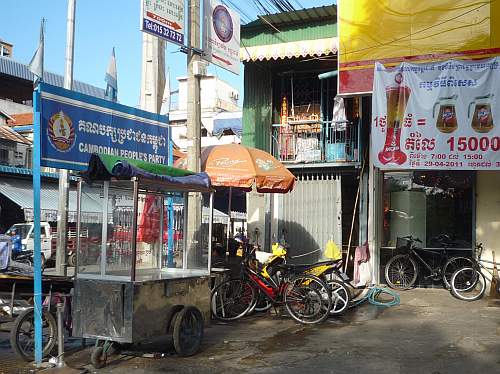
23 May 2011--Cambodian Doors
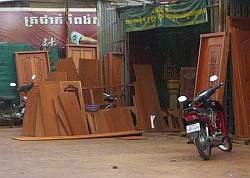
Click here to see pictures and commentary about Cambodian doors.
18 March 2011--Respect?
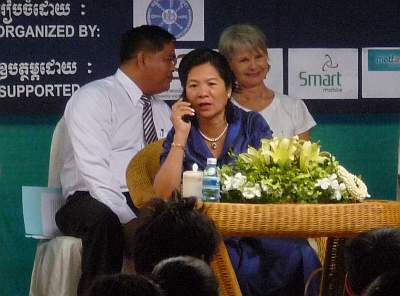 Today the Cambodian Disabled People's Organization organized a celebration for International Women's Day and the Deaf Development Programme sent our Year 2 students and teachers to participate. An official from the Ministry of Women's Affairs was invited to preside and speak, as is the custom. One might question the official's interest in and respect for women with disabilities, though, seeing how she answered her telephone right in the midst of a skit performed by the people with disabilities. This woman might be quite a wonderful person--she might even be a good government official--but her behavior reflects the attitude of so many government people, that they are above the general populace and that they operate by different laws, rules, and social conventions.
Today the Cambodian Disabled People's Organization organized a celebration for International Women's Day and the Deaf Development Programme sent our Year 2 students and teachers to participate. An official from the Ministry of Women's Affairs was invited to preside and speak, as is the custom. One might question the official's interest in and respect for women with disabilities, though, seeing how she answered her telephone right in the midst of a skit performed by the people with disabilities. This woman might be quite a wonderful person--she might even be a good government official--but her behavior reflects the attitude of so many government people, that they are above the general populace and that they operate by different laws, rules, and social conventions.
2 February 2011--New Year's Eve
Today is New Year's Eve for those who celebrate the Lunar New Year, and around the world, hundreds of millions of Chinese people are hurrying to get home for the family reunion dinner held this evening, one of the most important events of the year in Chinese culture. The Lunar New Year is not a public holiday in Cambodia but it is widely observed, especially by people with Chinese ancestry. At the government level, the officials don't want it to become a listed holiday because they are going to take off anyway and if it is official, then it would reduce the number of other official holidays the government celebrates. An expat friend who works in a government ministry told me that yesterday (Tuesday) his co-workers started packing up at 3:30 PM. When he asked why, he was told they were all leaving for the new year and wouldn't return until Monday, irregardless of the fact that it isn't a government holiday, and even if it were, the holiday wouldn't start until Thursday. My friend noted that the bosses in the ministry had already started their holiday a week and a half ago! That's the Cambodian government!

24 January 2011--Dangers on every side
Friday and Saturday morning I was preparing the bulletin for the weekend masses. Three times my computer crashed; it just stopped but each time I was able to reboot. I took it apart and did the usual cleaning of contacts, reseating plugs and sockets and connectors, etc., but the problem continued so at the last minute before I had to go to mass on Saturday evening, I took the computer to my repair shop so they could get a start on it Monday morning. Sunday I was hooking up another computer for a temporary work station and when I went to remove the plug from an extension cord, it was a melted, gooey mass! The computer wasn't crashing; the plug was melting and the pins of the plug were not making contact! It was another cheap adapter I was using because none of the wiring here is grounded and the houses all have two-pin round hole sockets while all the plugs are different, depending whether they come from North America, Europe, or Australia. I'm just glad I discovered this problem before it started a real fire. People often ask what is the most difficult thing to put up with in Cambodia. There are certainly big problems such as corruption, trafficking, acid attacks, etc., but for me what takes the greatest toll on my psyche is the relentless stream of little things that go wrong because of poor quality, no laws and regulations or enforcement, etc.
People often ask what is the most difficult thing to put up with in Cambodia. There are certainly big problems such as corruption, trafficking, acid attacks, etc., but for me what takes the greatest toll on my psyche is the relentless stream of little things that go wrong because of poor quality, no laws and regulations or enforcement, etc.
16 January 2011--Second Class Students
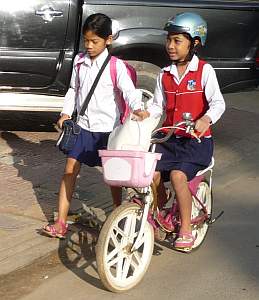 According to statistics produced by the government, approximately 40% of the Cambodian women older than 25 have "little to no education." This compares with 17.5% of the males in the same age group. In households where there were members under 25 years of age, only 10% of the girls were attending upper primary schools. Many reasons are given for the low numbers of women who are able to get even the most basic education. Probably the most significant are the societal and cultural attitudes which do not value learning for women. A gender bias also applies because in families with a limited amount of money for schooling, it is usually the boys who will receive it. There are other factors also, though. At DDP, when we have negotiated to use government classrooms for our deaf classes, we have found that all of the schools assigned to us except one had no toilets. Girls reach an age very quickly when they will no longer go to the nearby fields to pee like the boys do.
According to statistics produced by the government, approximately 40% of the Cambodian women older than 25 have "little to no education." This compares with 17.5% of the males in the same age group. In households where there were members under 25 years of age, only 10% of the girls were attending upper primary schools. Many reasons are given for the low numbers of women who are able to get even the most basic education. Probably the most significant are the societal and cultural attitudes which do not value learning for women. A gender bias also applies because in families with a limited amount of money for schooling, it is usually the boys who will receive it. There are other factors also, though. At DDP, when we have negotiated to use government classrooms for our deaf classes, we have found that all of the schools assigned to us except one had no toilets. Girls reach an age very quickly when they will no longer go to the nearby fields to pee like the boys do.